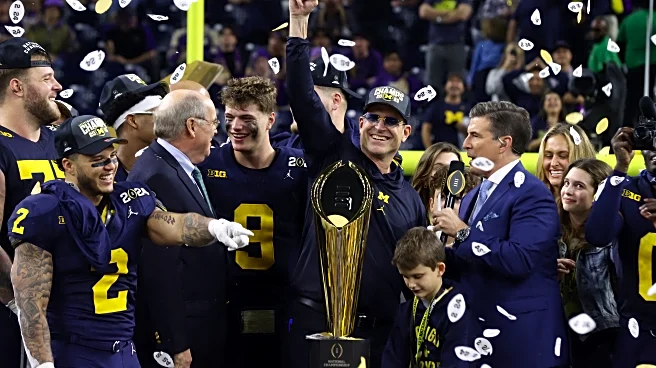The long-awaited day has finally come as the NCAA has finally released its findings in the Michigan-Connor Stalions sign-stealing investigation that was launched nearly two years ago at this point. On
Friday morning, numerous reports and the NCAA announced Michigan’s punishment – including penalties such as a hefty fine, show-causes for Jim Harbaugh and Connor Stalions, as well as an additional suspension for Sherrone Moore which won’t occur until 2026.
The list of punishments isn’t quite the “hammer-drop” that many opposing fan bases were expecting, indicating that Michigan’s crimes weren’t nearly as dubious as some thought. However, in its statement, the NCAA did mention that it had considered heavier punishment for the Wolverine program.
As a result of Michigan’s most recent infractions case, three parties — Michigan, Harbaugh and Moore — fall within the legislated window to trigger repeat violator status. Michigan’s repeat violator status, coupled with its Level I-Aggravated case classification, is sufficient grounds for a multiyear postseason ban. However, the panel determined that a postseason ban would unfairly penalize student-athletes for the actions of coaches and staff who are no longer associated with the Michigan football program. Thus, the panel determined a more appropriate penalty is an offsetting financial penalty instead of a two-year postseason ban.
As mentioned in the NCAA’s statement, the organization views Michigan as a “repeat violator,” referencing both the sign-stealing scandal as well as COVID-era recruiting violations that resulted in Jim Harbaugh being suspended for the first three games of the 2023 season. While it’s noteworthy that Michigan was considered for a postseason ban, it seems that this is more closely tied to the fact that Michigan was seen as a “repeat violator,” and not due to the specific nature of the Stalions investigation.
By mentioning as well that it didn’t want to unfairly punish Michigan’s current athletes in a matter from two years ago, it also suggests that something like a postseason ban was never really on the table. Furthermore, if the NCAA really believed that Michigan’s violations were worthy of a postseason ban, it likely would have simply laid down the punishment. After all, in today’s landscape of college athletics there’s nothing stopping players from entering the transfer portal and leaving a school that’s unable to compete in postseason play.
In fact, under usual circumstances where it would make sense for athletes to transfer (such as coaching changes), the NCAA grants exceptions to its normal transfer protocols to accommodate them. Something like to that effect could have been done with ease had the NCAA chosen a postseason ban in order to spare Michigan’s current players — but the NCAA ultimately chose otherwise. The vacating of wins and Michigan’s 2023 national championship were ultimately left off the table as well.
While the organization decided against a postseason ban, it did punished Michigan by taking its postseason revenue for the next two seasons, something that a school as wealthy as Michigan isn’t likely to be hurt much by anyway.
Ultimately, the NCAA chose the punishment that it felt fit the crimes that Michigan committed. The Wolverines will now look to fully turn the page as they prepare for the kickoff of the 2025 football season on August 30.











